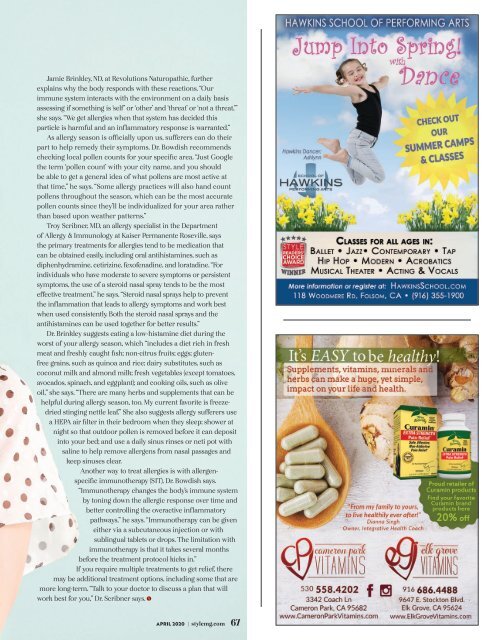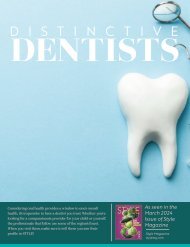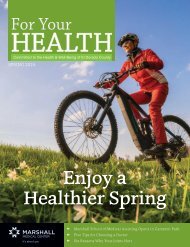Style Magazine April 2020
This month’s magazine focuses on myriad ways to soak up the springtime sunshine. Freelance writer, photographer, and former wilderness guide, Ryan Martinez, takes us through some of his favorite alfresco activities—mountain biking, backpacking, bouldering, etc.—in our cover story, “Your (Local) Guide to the Great Outdoors” (page 43), with some top spots to try each adventure, “know before you go” tips, must-have apps, and more. After perusing the incredible pictures and reading his recommendations, I definitely feel inspired and more prepared to explore more.
This month’s magazine focuses on myriad ways to soak up the springtime sunshine. Freelance writer, photographer, and former wilderness guide, Ryan Martinez, takes us through some of his favorite alfresco activities—mountain biking, backpacking, bouldering, etc.—in our cover story, “Your (Local) Guide to the Great Outdoors” (page 43), with some top spots to try each adventure, “know before you go” tips, must-have apps, and more. After perusing the incredible pictures and reading his recommendations, I definitely feel inspired and more prepared to explore more.
- No tags were found...
Create successful ePaper yourself
Turn your PDF publications into a flip-book with our unique Google optimized e-Paper software.
Jamie Brinkley, ND, at Revolutions Naturopathic, further<br />
explains why the body responds with these reactions. “Our<br />
immune system interacts with the environment on a daily basis<br />
assessing if something is ‘self’ or ‘other’ and ‘threat’ or ‘not a threat,’”<br />
she says. “We get allergies when that system has decided this<br />
particle is harmful and an inflammatory response is warranted.”<br />
As allergy season is officially upon us, sufferers can do their<br />
part to help remedy their symptoms. Dr. Bowdish recommends<br />
checking local pollen counts for your specific area. “Just Google<br />
the term ‘pollen count’ with your city name, and you should<br />
be able to get a general idea of what pollens are most active at<br />
that time,” he says. “Some allergy practices will also hand count<br />
pollens throughout the season, which can be the most accurate<br />
pollen counts since they’ll be individualized for your area rather<br />
than based upon weather patterns.”<br />
Troy Scribner, MD, an allergy specialist in the Department<br />
of Allergy & Immunology at Kaiser Permanente Roseville, says<br />
the primary treatments for allergies tend to be medication that<br />
can be obtained easily, including oral antihistamines, such as<br />
diphenhydramine, cetirizine, fexofenadine, and loratadine. “For<br />
individuals who have moderate to severe symptoms or persistent<br />
symptoms, the use of a steroid nasal spray tends to be the most<br />
effective treatment,” he says. “Steroid nasal sprays help to prevent<br />
the inflammation that leads to allergy symptoms and work best<br />
when used consistently. Both the steroid nasal sprays and the<br />
antihistamines can be used together for better results.”<br />
Dr. Brinkley suggests eating a low-histamine diet during the<br />
worst of your allergy season, which “includes a diet rich in fresh<br />
meat and freshly caught fish; non-citrus fruits; eggs; glutenfree<br />
grains, such as quinoa and rice; dairy substitutes, such as<br />
coconut milk and almond milk; fresh vegetables (except tomatoes,<br />
avocados, spinach, and eggplant); and cooking oils, such as olive<br />
oil,” she says. “There are many herbs and supplements that can be<br />
helpful during allergy season, too. My current favorite is freezedried<br />
stinging nettle leaf.” She also suggests allergy sufferers use<br />
a HEPA air filter in their bedroom when they sleep; shower at<br />
night so that outdoor pollen is removed before it can deposit<br />
into your bed; and use a daily sinus rinses or neti pot with<br />
saline to help remove allergens from nasal passages and<br />
keep sinuses clear.<br />
Another way to treat allergies is with allergenspecific<br />
immunotherapy (SIT), Dr. Bowdish says.<br />
“Immunotherapy changes the body’s immune system<br />
by toning down the allergic response over time and<br />
better controlling the overactive inflammatory<br />
pathways,” he says. “Immunotherapy can be given<br />
either via a subcutaneous injection or with<br />
sublingual tablets or drops. The limitation with<br />
immunotherapy is that it takes several months<br />
before the treatment protocol kicks in.”<br />
If you require multiple treatments to get relief, there<br />
may be additional treatment options, including some that are<br />
more long-term. “Talk to your doctor to discuss a plan that will<br />
work best for you,” Dr. Scribner says.<br />
APRIL <strong>2020</strong> | stylemg.com 67

















